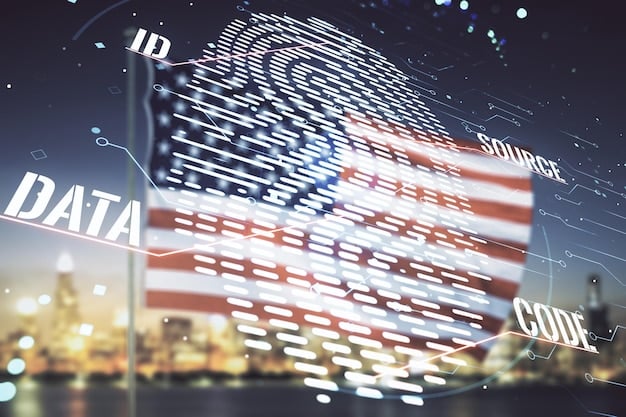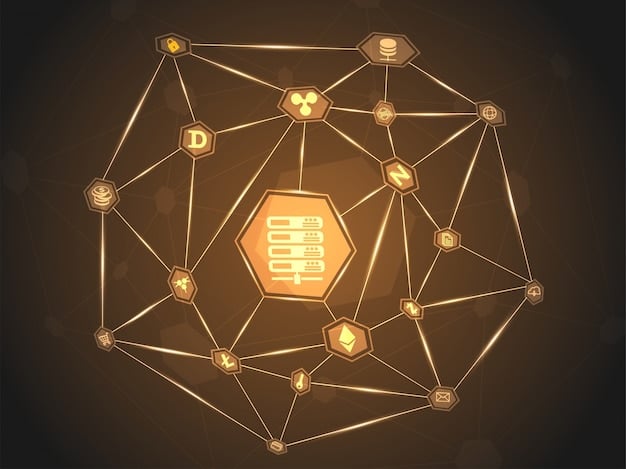Top 5 Cybersecurity Startups Protecting US Businesses in H1 2025

The landscape of cybersecurity is ever-evolving, and in the first half of 2025, five innovative startups distinguished themselves by offering cutting-edge solutions specifically designed to protect US businesses from the escalating threat of data breaches, leveraging advanced AI, behavioral analytics, and robust encryption to secure critical assets.
In an era where digital threats loom larger than ever, the resilience of US businesses hinges significantly on robust cybersecurity measures. As we navigate the complexities of the modern threat landscape, the imperative to protect sensitive data becomes paramount. This report delves into the innovative firms at the forefront of this battle, unveiling the top 5 cybersecurity startups protecting US businesses from data breaches in the first half of 2025.
The Evolving Threat Landscape for US Businesses
The digital frontier continues to expand, bringing with it both unprecedented opportunities and multifaceted threats. For US businesses, large and small, the risk of data breaches is not just a theoretical concern but a palpable and costly reality. The first half of 2025 has seen a notable increase in the sophistication and frequency of cyberattacks, compelling organizations to reassess their defensive postures.
Understanding the current threat landscape is crucial for effective protection. Cybercriminals are constantly refining their tactics, moving beyond simple malware to employ advanced persistent threats (APTs), supply chain attacks, and highly-targeted phishing campaigns. The proliferation of remote work, cloud-based infrastructure, and interconnected devices has broadened attack surfaces, making traditional perimeter security less effective.
Ransomware’s Persistent Shadow
Ransomware remains a dominant and destructive force. Attackers are no longer content with merely encrypting data; they are increasingly employing “double extortion” tactics, exfiltrating sensitive information before encryption and threatening to leak it if the ransom is not paid. This adds immense pressure on businesses, often leading to significant financial and reputational damage.
- Increased Sophistication: Ransomware groups are using more advanced encryption algorithms and evasion techniques.
- Supply Chain Vulnerabilities: Attacks often target third-party vendors, exploiting weaknesses to gain access to primary targets.
- Human Element Exploitation: Phishing and social engineering continue to be primary vectors for initial access.
Beyond ransomware, insider threats, though sometimes unintentional, also pose a significant risk, as do nation-state sponsored attacks targeting critical infrastructure or intellectual property. The aggregate effect of these threats underscores the urgent need for agile, intelligent, and proactive cybersecurity solutions.
AI in Attack and Defense
The dual-edged sword of artificial intelligence is strikingly evident in cybersecurity. While AI offers immense potential for defensive measures, capable of detecting subtle anomalies and predicting attacks, it is also being leveraged by adversaries to automate reconnaissance, craft more convincing phishing emails, and develop polymorphic malware that evades traditional detection. This arms race necessitates an equally AI-driven response from cybersecurity providers.
The implications for US businesses are clear: reliance on outdated security protocols is a recipe for disaster. The demand for innovative, adaptive, and predictive security solutions has never been higher, setting the stage for startups that can truly move the needle in the fight against breaches.
Selection Criteria for Top Cybersecurity Startups in H1 2025
Identifying the leading cybersecurity startups requires a rigorous evaluation process that goes beyond marketing hype. Our selection methodology for the top five companies protecting US businesses from data breaches in the first half of 2025 focused on several critical criteria designed to assess their true impact and potential.
First and foremost, we looked for innovation. The cybersecurity landscape demands novel approaches, not just iterative improvements. We prioritized startups that demonstrated a clear departure from traditional methods, offering solutions that tackle emerging threats in unique and effective ways. This includes leveraging cutting-edge technologies like advanced AI, quantum-resistant encryption, and sophisticated behavioral analytics.
Technological Innovation and Efficacy
A core criterion was the demonstrable efficacy of their solutions in preventing, detecting, and responding to data breaches. This wasn’t merely about impressive feature lists, but about validated performance against real-world attack scenarios and proven capabilities in reducing risk for businesses. We sought out technologies that were not only pioneering but also practical and scalable for diverse business needs.
- Proprietary Technology: Unique algorithms, frameworks, or methodologies that provide a distinct advantage.
- Real-World Impact: Case studies, pilot program results, or testimonials showcasing measurable improvements in security posture.
- Scalability: Solutions capable of growing with businesses, from SMBs to large enterprises, without significant performance degradation.
Another crucial factor was their focus on the US market. While global solutions are valuable, these startups demonstrated a specific understanding of the regulatory environment, compliance requirements (such as HIPAA, CCPA, or NIST frameworks), and unique threat vectors prevalent in the United States. This localized expertise often translates to more tailored and effective protection.

User Experience and Integration
Beyond raw technological power, we assessed the usability and integration capabilities of their platforms. Even the most advanced security solution is ineffective if it’s too complex to implement or manage by existing IT teams. Startups that offered intuitive interfaces, seamless integration with existing IT infrastructure, and robust support channels scored higher.
Finally, we considered their market traction and potential for significant future growth. This involved evaluating their funding rounds, strategic partnerships, customer acquisition rates, and the strength of their leadership teams. A strong market position indicates confidence from investors and early adopters, suggesting the company is well-positioned to continue its trajectory in protecting US businesses.
1. VigilantShield AI: Predictive Threat Intelligence
At the apex of our list for the first half of 2025 is VigilantShield AI, a startup that has rapidly distinguished itself through its groundbreaking approach to cybersecurity: predictive threat intelligence powered by advanced machine learning. Unlike traditional systems that react to known threats, VigilantShield AI proactively identifies potential vulnerabilities and anticipates attack vectors before they can be exploited, offering US businesses an unprecedented layer of defense.
Their core innovation lies in their proprietary AI engine, which continuously analyzes vast datasets of global cyber activity, including emerging malware signatures, dark web intelligence, and geopolitical shifts. This allows the platform to build highly accurate predictive models that alert organizations to threats before they materialize. For businesses, this translates into the ability to patch vulnerabilities, strengthen defenses, or isolate potential targets ahead of an actual attack, drastically reducing the window of opportunity for attackers.
Key Offerings and Impact
- Proactive Vulnerability Scanning: Identifies and prioritizes weaknesses in network infrastructure, applications, and cloud environments based on predictive analysis.
- Behavioral Anomaly Detection: Monitors user and system behavior, flagging deviations that indicate a potential insider threat or compromised account, even if no known malware is present.
- Tailored Threat Hypotheses: Generates specific, actionable hypotheses about potential attacks targeting the client’s unique digital footprint, enabling targeted defensive strategies.
VigilantShield AI’s impact on US businesses has been profound. Early adopters report a significant reduction in successful phishing attempts and ransomware incidents, attributing it directly to the platform’s ability to forecast and neutralize threats. Their solution is particularly beneficial for medium to large enterprises with complex network architectures and sensitive data assets, where a single breach could be catastrophic. The company’s intuitive dashboard and seamless integration capabilities further enhance its appeal, making sophisticated predictive security accessible to a broader range of organizations.
2. QuantumGuard Technologies: Post-Quantum Cryptography Solutions
QuantumGuard Technologies secures its position as a top innovator by addressing one of the most significant long-term threats to data security: the advent of quantum computing. While fully functional quantum computers are still some years away, the data encrypted today could be easily compromised by future quantum adversaries. QuantumGuard Technologies is at the forefront of developing and deploying post-quantum cryptography (PQC) solutions, offering US businesses a critical shield against future data breaches.
Their proprietary technology implements cryptographic algorithms designed to withstand attacks from quantum computers, ensuring the long-term confidentiality and integrity of sensitive information. This proactive stance is essential for industries handling highly sensitive data such as financial institutions, healthcare providers, and government contractors, where data longevity and future-proofing are paramount. QuantumGuard’s approach is not just theoretical; they are rapidly integrating PQC into existing encryption protocols and key exchange mechanisms, making it practical for immediate enterprise adoption.
Ensuring Future Data Security
The challenge with post-quantum cryptography is not just developing the algorithms but integrating them in a way that doesn’t disrupt current operations or introduce new vulnerabilities. QuantumGuard has excelled here, creating user-friendly APIs and SDKs that allow businesses to transition to quantum-safe encryption without overhauling their entire IT infrastructure. Their solutions range from securing data at rest and in transit to protecting digital signatures and secure communication channels.
- Quantum-Safe VPNs: Encrypts network traffic using PQC algorithms, providing an unbreakable tunnel for data transmission.
- PQC-Enabled File Encryption: Protects sensitive files stored on servers or cloud platforms from future quantum attacks.
- Secure Key Exchange: Utilizes quantum-resistant protocols for establishing secure communication sessions, crucial for protecting financial transactions and confidential interactions.
For US businesses looking to mitigate “harvest now, decrypt later” attacks, where encrypted data is stolen today with the intention of decrypting it once quantum computers are available, QuantumGuard Technologies offers an indispensable solution. Their foresight and practical implementation capabilities position them as a vital player in safeguarding the nation’s most sensitive data assets against tomorrow’s threats.
3. CipherLock Identity: Decentralized Identity Management
CipherLock Identity is revolutionizing how US businesses manage digital identities, a critical vector for data breaches. Their innovative platform leverages blockchain and decentralized identity principles to provide a more secure, privacy-preserving, and user-centric approach to authentication and authorization. By eliminating centralized honeypots of identity data, CipherLock significantly reduces the risk of large-scale identity-related breaches.
Traditional identity management systems often rely on centralized databases, which, if compromised, can expose millions of user credentials. CipherLock’s decentralized model distributes identity components across a secure blockchain network, giving users ultimate control over their data and preventing any single point of failure. This framework makes it exponentially harder for attackers to harvest credentials or impersonate legitimate users, thereby safeguarding access to sensitive systems and data.
Empowering Secure Access
The company’s solution isn’t just about security; it also enhances compliance and user experience. By empowering users with self-sovereign identities, businesses can simplify onboarding processes, streamline access management, and ensure adherence to privacy regulations like GDPR and CCPA. CipherLock provides an accessible toolkit for integrating their decentralized identity protocols into existing enterprise applications and services.
- Self-Sovereign Identity Wallets: Users securely store and manage their verifiable credentials, sharing only necessary information directly with businesses.
- Zero-Knowledge Proof Authentication: Verifies user identity without revealing sensitive underlying data, enhancing privacy and reducing exposure.
- Immutable Audit Trails: Blockchain-based records of access and identity events provide an unalterable log for forensic analysis and compliance.
CipherLock Identity is particularly impactful for industries with high regulatory burdens and those that process vast amounts of personal identifiable information (PII), such as finance, healthcare, and e-commerce. Their technology represents a paradigm shift, moving identity security from a perimeter defense model to a distributed, cryptographic one, directly combating one of the most common causes of data breaches in the US.

4. DarkWeb Watchdog: Proactive Data Leak Detection
DarkWeb Watchdog has carved out a vital niche in the cybersecurity ecosystem by specializing in proactive data leak detection on the dark web and illicit marketplaces. For US businesses, this means gaining early warning about compromised credentials, intellectual property, or sensitive internal documents that may have been exfiltrated and are being traded or sold online before they lead to a full-blown data breach or wider exploitation.
Their platform employs sophisticated AI-driven crawlers and natural language processing (NLP) to monitor vast swathes of the dark web, underground forums, private chat groups, and even paste sites. When an organization’s proprietary data, employee credentials, or customer information appears in these clandestine corners of the internet, DarkWeb Watchdog immediately alerts the affected business, providing actionable intelligence for rapid response and mitigation.
Minimizing Breach Impact
The value of DarkWeb Watchdog lies in its ability to enable preemptive action. By identifying a leak early, businesses can quickly rotate compromised credentials, invalidate tokens, inform affected customers, or initiate legal proceedings against the perpetrators, significantly minimizing the potential damage and regulatory penalties associated with a breach. Their service acts as an invaluable early warning system, turning potential crises into manageable incidents.
- Credential Monitoring: Alerts businesses when employee login credentials or corporate network access details are found on the dark web.
- IP Theft Detection: Scans for mentions or listings of proprietary source code, product designs, or trade secrets.
- Third-Party Leak Alerts: Identifies data leaks originating from compromised third-party vendors or partners that could affect the client.
For any US business, especially those with significant intellectual property, large customer bases, or frequent third-party interactions, DarkWeb Watchdog offers an indispensable layer of external threat intelligence. Their focused expertise allows organizations to extend their security perimeter beyond their internal networks, gaining visibility into threats originating from the shadier corners of the internet and securing sensitive data from widespread exposure.
5. ResilientFlow Security: Automated Incident Response
Rounding out our top five is ResilientFlow Security, a startup that is fundamentally changing how US businesses respond to and recover from cyber incidents. While prevention is paramount, no security system is 100% foolproof. ResilientFlow excels in minimizing the impact of a breach through highly automated and intelligent incident response (IR) workflows, drastically reducing dwell time and recovery periods.
Their platform integrates with existing security tools (SIEMs, EDRs, firewalls) and uses AI to orchestrate rapid, pre-defined responses to detected threats. This automation eliminates the delays inherent in manual investigations and decision-making, allowing businesses to contain breaches faster, isolate compromised systems, and initiate recovery procedures with unprecedented speed. For organizations where every second counts during an attack, ResilientFlow’s efficiency is a game-changer.
Streamlining Breach Recovery
ResilientFlow’s solution extends beyond containment to encompass the full incident lifecycle, including forensic analysis, remediation, and post-incident reporting. Their system provides detailed, real-time insights into the nature and scope of an attack, enabling security teams to make informed decisions and demonstrate compliance with regulatory requirements. The platform’s adaptive learning capabilities refine response playbooks over time, making future incidents even more manageable.
- Automated Containment: Instantly isolates compromised endpoints, disables malicious processes, or blocks suspicious network traffic upon detection.
- Orchestrated Remediation: Automates tasks like patch deployment, configuration changes, and threat hunting across the affected environment.
- Real-time Forensic Data Collection: Gathers critical logs and evidence during an incident, preserving integrity for investigation and compliance.
For US businesses of all sizes, the ability to respond swiftly and systematically to a breach can mean the difference between a minor incident and a catastrophic event. ResilientFlow Security empowers security teams to be more effective, reduce human error in stressful situations, and drastically cut down the financial and reputational costs associated with cyberattacks, making them an indispensable ally in the fight against data breaches.
| Key Area | Brief Description |
|---|---|
| 🛡️ Proactive Defense | VigilantShield AI offers unique predictive threat intelligence. |
| ⚛️ Future-Proofing | QuantumGuard secures data against future quantum threats. |
| 🔑 Identity Security | CipherLock Identity provides decentralized access management. |
| 🚨 Rapid Response | ResilientFlow Security automates incident response. |
Frequently Asked Questions
▼
These startups are crucial because they address immediate and emerging threats with innovative, specialized solutions. They offer proactive defense, future-proof quantum security, robust identity management, early data leak detection, and rapid incident response, covering critical gaps in traditional cybersecurity. Their focus on the US market also means tailored compliance and threat awareness.
▼
Predictive threat intelligence leverages AI and machine learning to analyze vast datasets, identifying patterns and anomalies that indicate potential future attacks. By understanding evolving threat actor tactics and techniques, it forecasts where and how an attack might occur, allowing businesses to strengthen specific vulnerabilities proactively and implement countermeasures before a breach materializes.
▼
Post-quantum cryptography (PQC) includes cryptographic algorithms resistant to attacks from future quantum computers. It’s important now because data encrypted today could be harvested by adversaries and decrypted later using powerful quantum machines. Adopting PQC proactively ensures long-term data confidentiality, especially for sensitive information that needs to remain secure for decades.
▼
Decentralized identity management, often blockchain-based, eliminates centralized repositories of user credentials, which are common targets for attackers. By distributing identity data and giving users control over their verifiable credentials, it reduces single points of failure, enhances privacy, and makes it significantly harder for attackers to compromise and impersonate identities across multiple services.
▼
Absolutely. While some solutions might seem enterprise-focused, many of these startups offer scalable products or have tiered pricing models that make advanced cybersecurity accessible to SMBs. Data breaches impact businesses of all sizes, and proactive, intelligent protection is increasingly essential. The user-friendly interfaces and robust support offered by these innovators aim to broaden adoption.
Conclusion
The first half of 2025 has unequivocally demonstrated that cybersecurity is not a static challenge but a dynamic battle requiring continuous innovation. The five startups highlighted—VigilantShield AI, QuantumGuard Technologies, CipherLock Identity, DarkWeb Watchdog, and ResilientFlow Security—represent the vanguard of this innovation, each addressing critical facets of data breach protection for US businesses. From predictive intelligence and future-proof encryption to decentralized identity and automated response, their combined efforts are building a more resilient digital economy. As the threat landscape continues to evolve, the adaptability and ingenuity of these groundbreaking companies will be instrumental in safeguarding the nation’s vital information assets.





